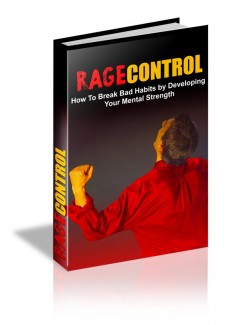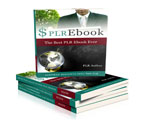 License Type: Private Label Rights
License Type: Private Label Rights  File Size: 3,812 KB
File Size: 3,812 KB File Type: ZIP
File Type: ZIP
 SKU: 53347
SKU: 53347  Shipping: Online Download
Shipping: Online Download
Sample Content Preview
Foreword
We all understand what anger is, and we've all experienced it: whether as a fleeting annoyance or as full-fledged rage.
Anger is a totally normal, commonly healthy, human emotion. But when it gets out of control and turns destructive, it may lead to troubles—troubles at work, in your personal relationships, and in the total quality of your life. And it may make you feel as if you're at the mercy of an unpredictable and mighty emotion. This book is meant to help you comprehend and control rage.
Stay Free Through Rage Control!
Master your emotions and live a normal life!
Chapter 1: Understanding Rage
Synopsis
Anger/rage is technically not an emotion; rather it's a protective reaction to a sensed fear or threat. Let me state that again: rage isn't truly an emotion; it’s a protective reaction to a sensed hurt or threat.
Consider it; have you ever gotten mad about something that on some level didn't feel threatening to you? Somebody cuts you off, somebody tells you to do something you don't wish to do, a loved one sounds out or does something that feels controlling or simply plain mean. All of these situations may be felt as threatening. And when threatened, our inherent aptitude is to protect ourselves or something really bad may happen to us. That‘s where anger, rage and aggression come in.
Know The Basics
Once we think of anger we commonly think of the actions we see on the surface - for instance, your body tenses, you may shout, throw things or get violent. All the same, this is really more of a definition of rage than anger.
Anger and rage is not the same thing. You are able to be angry without being in a rage. Reviewing your own experiences you'll without doubt discover times where you got angry and dealt with it in an unaggressive way (e.g. Refusing the urge to hit your boss as you'd lose your job).
Anger is an emotion that's normal to all of us. Commonly, it’s an alarm that something is wrong. Utilize that signal the correct way and it may be your friend. Utilize it the improper way and its trouble. It’s good to release anger. It takes an tremendous amount of energy to hold rage inside and it may eventually lead to hypertension, diabetes, gastric reflux, heart condition, cancer and a whole cluster of additional things you likely don‘t wish to have.
Trust it or not, if you utilize anger properly, you might find that you have happier and fitter relationships. Positive utilization of anger may likewise build self-respect. If you're able to tell somebody your feelings rather than holding them inside (note - I said ?tell-not –shout), you're saying to them and to yourself, ?I'm a valuable individual and I expect to be addressed as such.
An illustration of a positive expression of anger may be that you've a friend that is perpetually late. This is really troubling to you, but you do say anything? If you don’t one of two matters will likely occur. You'll either stuff and stuff and stuff till you explode at her or you'll begin to become passive aggressive and start to make excuses to avoid her. Either way you might lose a friend.
On the other hand, If you're able to tell your friend that being tardy is hard for you and makes you feel insignificant, she might really listen, apologize, and start to arrive promptly. You might really wind up closer than you were to begin with.
The issue for many individuals in dealing with rage is that your habit (and its truly crucial to consider rage as a habit as that‘s all it truly is) is to drive right into the aggression acres. Your goal isn't to make anger disappear. Rather your goal here is to learn to deal with rage in different ways; ways that will leave you empowered rather than with the temporary fantasy of power that aggressiveness might give you.
The choice of how you respond to individuals or situations lies inside you . If your rage really was effective individuals or situations would change and we wouldn‘t keep becoming irritated at them. You can‘t control others, the only thing that you are able to control is how you deal with and express your rage.
In my experience, rage is almost like an addiction in that individuals are really creative in discovering all sorts of rationales for their rage. From time to time it’s almost as though they're in denial. Part of the reason for this is that they way our conduct appears on the inside may look a whole lot different to somebody on the receiving end of things!
Chapter 2: How Do You Deal With It
Synopsis
Rage comes in a lot of flavors. Individuals commonly fall into one of eight distinct styles of rage. Let’s take a short look at each one. Look for the one that most suits you.
Which One Are You
Dr. Jeckyl and Mr. Hyde
Dr. Jeckyl and Mr. Hyde are commonly pretty relaxed individuals till something goes wrong, and then look out! They may go from zip to 60 in the flash of an eye. They have really depressed frustration tolerances and will take out their exasperation on whom or whatever is sensed to be inducing a hitch in their lives: be it colleagues, loved ones, traffic, a lift that's slow in arriving, you name it. Frequently, when they chill out they realize that they went overboard and will apologize to whoever got on the receiving end of the attack. This might work the first time or two, but individuals frequently become alienated when the same thing occurs again and again. Frequently, they’ll see themselves as having a rage issue and vow to not react that way any longer, only to do so again and again. They frequently wish they could change, but feel themselves to weak to do so.








